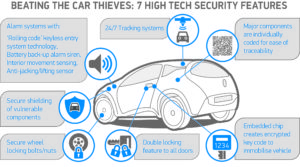- New YouGov survey shows 43 per cent of motorists have left their car keys with a stranger, compared with just 11 per cent of Brits who have done the same with their house keys.
- Just 11 per cent of drivers believe security is the most important factor when looking for a car park.
- Car theft has declined significantly, but following a recent rise in incidents a new initiative is encouraging drivers to remain vigilant of their vehicles and keys.
Two in five car owners don’t appear to think twice about leaving their car keys with a stranger, despite the potential security risk, according to the results of a YouGov consumer survey published by the automotive industry, government, police and insurance bodies.
Car theft has fallen significantly since the mid-1990s when, at its peak, up to 620,000 cars were stolen each year. Today that figure is below 80,000. However, responding to police figures showing reported incidents rose by 8 per cent in the year to March 2016, SMMT, Home Office, Metropolitan Police Service and Thatcham Research, the motor insurers’ automotive research centre, have joined forces to understand the nature of modern day car theft and develop solutions to tackle it.
Now, alongside the results of the survey, they are publishing a 10-point plan to help owners secure their cars to help beat the thieves.
The survey found that in the past 12 months, 43 per cent of British drivers have left their car keys with someone they don’t know, with 71 per cent of them not checking whether the company or individual was a member of an accredited code of practice or other professional standard. In comparison, just 11 per cent said they have trusted their house keys to a stranger.
Meanwhile, just 11 per cent of people said the first thing they look for in a car park is CCTV, gated entry or manned barriers. At home, respondents admitted to leaving their car keys in clear view or close to the front door on a hallway hook or sideboard, leaving them at risk of opportunistic thieves.
Cars are more secure than ever before, with manufacturers continually working on new security features. Investment in new technology means that all new cars sold in the UK now have an immobiliser and many are fitted with an alarm and double locking as standard.
However, car owners can also play an important part in protecting their vehicles by taking simple preventative measures, including parking in well-lit and secure parking spaces, double checking your car is locked before walking away, and checking the credentials of any company with which you leave your keys.
Mike Hawes, Chief Executive, SMMT, said: “New cars have never been more secure and the latest technology has helped bring down vehicle theft dramatically. Manufacturers invest billions of pounds every year to stay one step ahead of the criminals, and the latest models include sophisticated immobilisers, smartphone-controlled tracking devices and random key codes to prevent cloning. Technology can only do so much, however, and while car makers, the police and government continue to work together to ensure that stealing cars is as difficult as possible, these latest figures show there’s more consumers can do to minimise risk.”
DCI Sarah Staff of the Met’s Organised Crime Command, said: “Criminals are constantly seeking new ways to steal cars and organised criminals are using increasingly sophisticated methods. The Met’s central Organised Vehicle Crime Unit works closely with the car industry in an attempt to reduce vehicle crime; we have conducted several successful investigations in this area and continue to do so. Vehicle owners should be reassured that car theft is at its lowest level for many years, but they should not be complacent, it’s important to take sensible precautions and remain vigilant to avoid being a victim of car theft.”
Ten point plan to help drivers secure their cars:
- Think about who you leave your vehicle keys with. Treat them as you do your house keys – do you know the person you are leaving your keys with? Do you trust them?
- Check who you are leaving your vehicle keys with. Where possible, check that a company you entrust your keys to is a member of an accredited code of practice or other professional standard such as Motor Codes; the British Parking Association’s Park Mark scheme; or the Car Wash Advisory Service’s WashMark initiative.
- Think about where you park your vehicle – is it in a safe place? Well-lit and well-populated areas or car parks with security features such as CCTV, manned barriers or gated entry will give you greater peace of mind.
- Check that your vehicle is locked before leaving it. Listen for the locking noise, watch for the lights to flash or mirrors to fold, or simply pull the door handle.
- Think about where you leave your spare key. Don’t leave it in your vehicle, and be mindful of how many spares you have and where they are kept.
- Check that you haven’t left valuables on display in your vehicle. We all know that this can attract opportunist thieves.
- Check that the vehicle’s windows are closed, even if you are only leaving it for a few minutes. Open windows make it all the easier for thieves to gain access.
- Think about where you keep your keys at home. Keep them well away from the door or windows and out of sight.
- Check that your alarm or immobiliser is enabled when you leave your car. A simple check could save considerable expense and inconvenience later.
- Check whether your vehicle has an alarm or immobiliser. If it doesn’t, think about buying an aftermarket alarm, steering wheel lock or other locking device. These are proven to deter thieves.


















